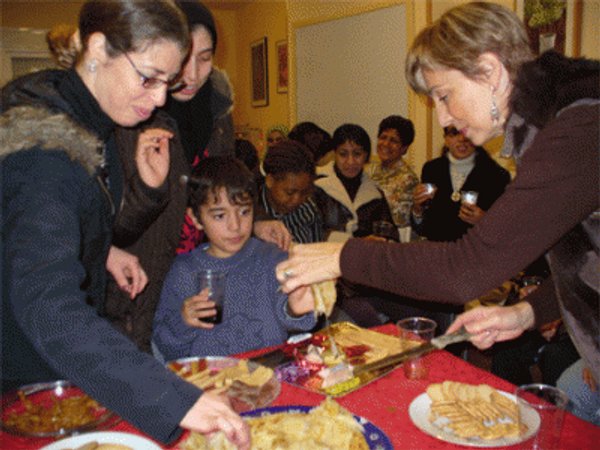The Association for Assistance to Immigrant Women, ADAIA, began in the year 2001. It started as the initiative of three women who were keenly aware of the difficult situation immigrant women faced when seeking to begin a new life in Lleida, a town near Barcelona. Seeing the daunting challenges these women faced in trying to adapt to a new culture and new customs, they decided to try to assist them in their human and cultural formation.
Anna Mestre, one of the founding members, explains: "All of this began on our own initiative when we saw the reality of an increasing number of immigrant women who come to our country in search of work. Many end up caring for our homes, our children and our parents. They do all this without preparation for this work and without legal safeguards."

"First we contacted a priest in charge of the pastoral work with immigrants in Lleida, the church of Our Lady of Ransom and some public institutions. We started our work in a space lent to us by the local government. The collaboration of civil and religious institutions makes it possible to follow up with each person and to clarify each one’s needs. What one institution cannot provide another is able to provide. When there is a need for it we work with social workers to find solutions. ADAIA doesn’t have anything, but when ADAIA asks people always say Yes."
From the start, the primary objective of ADAIA was professional training tailored to the women’s specific needs. The first course was given in a local government building, and 20-25 women participated in the classes two days a week. The class size grew and today about 60-100 women attend the courses. Anna explains, "People know how we operate and those attending tell their friends about the courses." With the increase in class size they had to look for another meeting place, and a cooperator of Opus Dei lent some office space for this purpose.
ADAIA is also helping some of these women to learn how to read. "There is a young Arab woman with strong religious convictions who we helped when she arrived in Lleida. She now calls me her sister. She is so grateful for what we did for her that she currently gives classes in ADAIA for illiterate Arabic women, teaching them how to read.. This is something we wouldn’t be able to do on our own."
"Another nice story is that of a young woman for whom we found a private home where she could work. One day she came to ask us for help. She needed to prepare a meal, but didn’t know the name of the ingredients in Catalan. Together we made a list of the ingredients and went to the supermarket to buy them. I pointed out to her what each food was, and she jotted down the Catalan name for the next time."

To help people effectively, one needs to know their life situation, and this is only possible through visiting families in their homes. Those who volunteer with ADAIA have gotten to know many families. They notice that families need furniture, or sometimes food and clothing. Anna says, "One day we had a family come to us who had been given a voucher to obtain food, but the voucher was only valid the following week. We went to the supermarket with the young woman to get some essential food for that week."
The women helped by ADAIA come from a variety of cultural and religious backgrounds. While respecting each person’s religious beliefs, "for those who wish we offer talks and catechism classes, and some of the children of the mothers who come to ADAIA have been baptized."
Anna narrates many stories. "The following is a sad story, yet also a beautiful one. A young Latin American woman came to Lleida with two children; one was two and other nine. She had left two other children back home in her country. Alex, the nine-year-old, was diagnosed with leukemia, and had to have a bone marrow transplant. In the meantime, the other two children arrived. With Alex in the hospital the mother was unable to care for the other children. We looked for a family who could take care of the two year old daughter and we found one in Barcelona. A short time afterwards Alex died. But before he died, with the mother’s agreement, Alex was baptized and received first holy communion."
